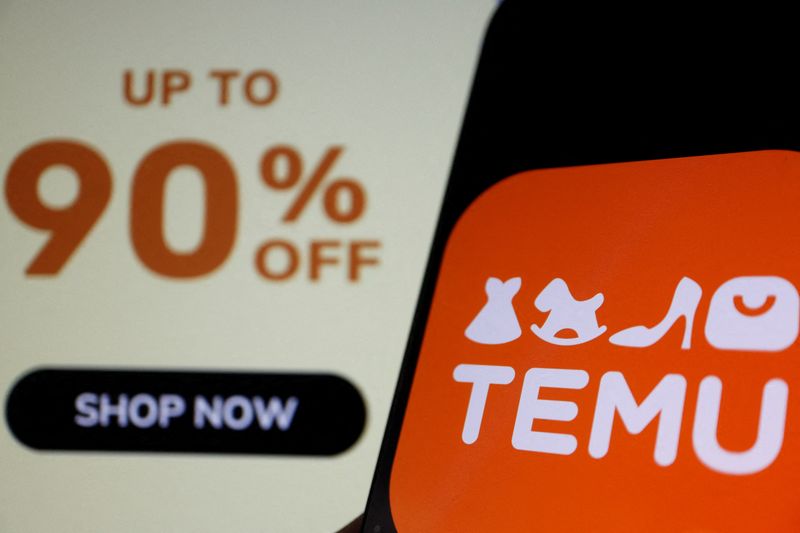By Casey Hall
SHANGHAI (Reuters) - Discount e-commerce is set to dominate globally during the critical upcoming holiday shopping season in the West and Singles’ Day in China, analysts said.
Platforms in China, the world’s largest e-commerce market, have recently described a “value-for-money battle” stoked by economic insecurity and a slower-than-expected retail recovery following the lifting of COVID-19 curbs late last year.
In much of the rest of the world, meanwhile, from Southeast Asia to North America and Europe, consumers are in the thrall of fast-growing platforms, like PDD Holdings' Temu and Bytedance-owned TikTok Shop, which ship cheap goods from China at a time when cost-of-living is front of mind for many.
China has long been a major exporter of a host of consumer products, but this latest export trend, of its e-commerce marketplace dynamics to the rest of the world, has shaken up online shopping globally.
Low-cost platforms in China, as well as multinational companies shipping from the country, look set to shape the year's final quarter - one that included the all-important holiday season, as well as China's largest shopping festival.
“These marketplace dynamics that first emerged from China, or were invented in China, are now dominating the Western world,” said Sharon Gai, the former head of global key accounts at Alibaba (NYSE:BABA) and author of "E-commerce Reimagined."
“(Other online retailers) are seeing this insurgence of these cheap Chinese goods that are flooding in from the likes of Temu and Shein and their boats have been rocked," she said. "They don't know if they can compete.”
The trend towards low-cost platform isn’t happening in a vacuum however, but bolstered in part by macroeconomic challenges facing different markets - including belt-tightening amid economic uncertainty in China and inflation in the United States and European markets putting pressure on consumer spending.
Fast-rising discount competitors, such as Pinduoduo (NASDAQ:PDD) and Douyin in China and Temu and Shein, which have rolled out their services to countries from Canada to Australia, as well as across Latin America and some Asian markets, are themselves pouring billions of dollars into subsidies and discounts to grow market share among consumers who are happier to snap up $10 dresses and $5 headphones than higher-priced items.
Amazon (NASDAQ:AMZN) is set to ramp up discounts during its Oct. 10-11 "Prime Big Deal Days."
"From an e-commerce standpoint, you definitely notice the massive amounts of discounting that are currently occurring, even on Amazon,” Humphrey Ho, U.S. managing partner at digital advertising agency Hylink Digital, said.
The battle for the bottom in many markets is only likely to get more aggressive with the entrance of TikTok Shop, which in the United States will also focus on Chinese-made goods, as Shein and PDD Holdings' Temu have done with success.
TikTok Shop is already preparing merchants to offer deep discounts and promotions during the U.S. holiday season. The company is waiving merchants' fees to offset the costs of those discounts and to encourage sellers to bring more merchandise to TikTok Shop and away from Amazon.
Indonesia, in response to concerns that TikTok Shop could flood the market with cheap goods, is considering banning e-commerce transactions on social media altogether to protect offline merchants.
VALUE VACUUM
The rise of cheap online players' growing market share globally is also filling a space at the low-cost end of e-commerce that has existed for a while; previously, many of the world’s dominant platform players were focused on selling higher margin items to achieve profitability.
“There was a clear vacuum for the discount retailer online experience ... There is still so much more room still to grow in the discount arena,” said tech analyst Rui Ma, who specializes in U.S. and Chinese companies.
Across the world, executives are now focusing on price pressures as discount online retailers gain increasing market share. In a call with analysts following Chinese e-commerce giant Alibaba’s latest quarterly earnings report last month, Trudy Dai, CEO of Taobao and Tmall Group, said the “value-for-money battle will continue and will be an area of major investment."
Though giants Alibaba and JD (NASDAQ:JD).com grew faster than expected in their most recent quarters, their growth was dwarfed by PDD Holdings 66% year-on-year revenue rise as its discount e-commerce platform Pinduoduo attracted price-conscious customers in China and its international shopping site, Temu, continued to grow rapidly elsewhere.
While prevailing structural and macro environments have paved the way for this race to the bottom, a change in broader trends may also bring about a shift in focus for e-commerce shoppers and platforms alike.
“Inside China the platforms are just addressing a consumer confidence moment. In the West, the inflation driven consumer wants something cheaper because they're going through a moment of financial insecurity,” Ho said.
“If the consumer is having a good economic time, they will always seek to upgrade. That might affect and dampen these (discount-focused) platforms’ growth, if you start seeing the economy come back up.”
